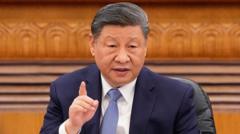In reaction to President Trump's decision to impose a blanket 20% tariff on EU goods, European leaders are bracing for economic fallout while negotiating a possible resolution. Concerns about significant impacts on trade, including major sectors like agriculture and industry, have prompted swift meetings among EU members to discuss countermeasures.
Europe Prepares for Potential Trade War Amid Trump’s New Tariffs

Europe Prepares for Potential Trade War Amid Trump’s New Tariffs
As the U.S. implements a 20% tariff, European leaders strategize responses while aiming for negotiations.
Europe’s leaders are launching into action after President Trump’s unexpected announcement of a 20% tariff on all European goods, a measure that has devastated hopes for free trade and led to severe economic concerns across the continent. French Prime Minister François Bayrou described the tariffs as "a catastrophe for the economic world," while EU Commission chief Ursula von der Leyen warned that the repercussions could be catastrophic for millions worldwide. The EU, representing 27 member states, is preparing to engage in negotiations with the U.S. while simultaneously bracing for potential retaliation.
EU Trade Commissioner Maros Sefcovic has outlined plans to address the tariffs directly with U.S. officials, noting that Europe would respond in a "calm," unified manner. Italian Prime Minister Giorgia Meloni, who previously expressed reservations about reciprocal measures against the U.S., convened an emergency meeting to strategize a response, revealing fears that U.S. consumers might turn to counterfeit products instead of Italian exports, which are valued at approximately €1.6 billion.
Moreover, Spanish Prime Minister Pedro Sánchez has sought to clarify misconceptions regarding U.S. claims of EU-imposed tariffs, issuing a warning about the broader implications of Trump’s newly enforced protectionist policies. He announced a €14.1 billion plan to support Spanish industries, particularly those like machinery that are at risk of losing approximately 14% of their exports to the U.S.
Slovakia faces some of the gravest risks due to its reliance on heavy industrial exports, with economists predicting a decline of at least 2.5% in economic performance over the next two years. In Poland, Prime Minister Donald Tusk anticipates a 0.4% drop this year, while French wine and spirits producers are especially concerned, estimating a loss of around €1 billion to the industry.
As European markets brace for the impact, sentiments have turned gloomy with significant drops in stock values for companies like Adidas. Small businesses exporting goods, such as a Sicilian olive oil family-run operation, feel particularly vulnerable, facing a sudden halt in their launch into the American market.
While some European countries have unanimously condemned President Trump’s trade strategies as detrimental to global trade, Hungary’s Foreign Minister Peter Szijjarto has controversially attributed blame to the EU's handling of the situation. With Norway also feeling the pinch despite its non-EU status, all eyes are now on how the EU will navigate the complex challenges posed by this trade dispute and maintain unity amidst growing pressures.
As the situation continues to evolve, the EU remains prepared with plans for countermeasures that could hit not only U.S. goods but also digital services, signaling a potential escalation in this brewing trade conflict.






















